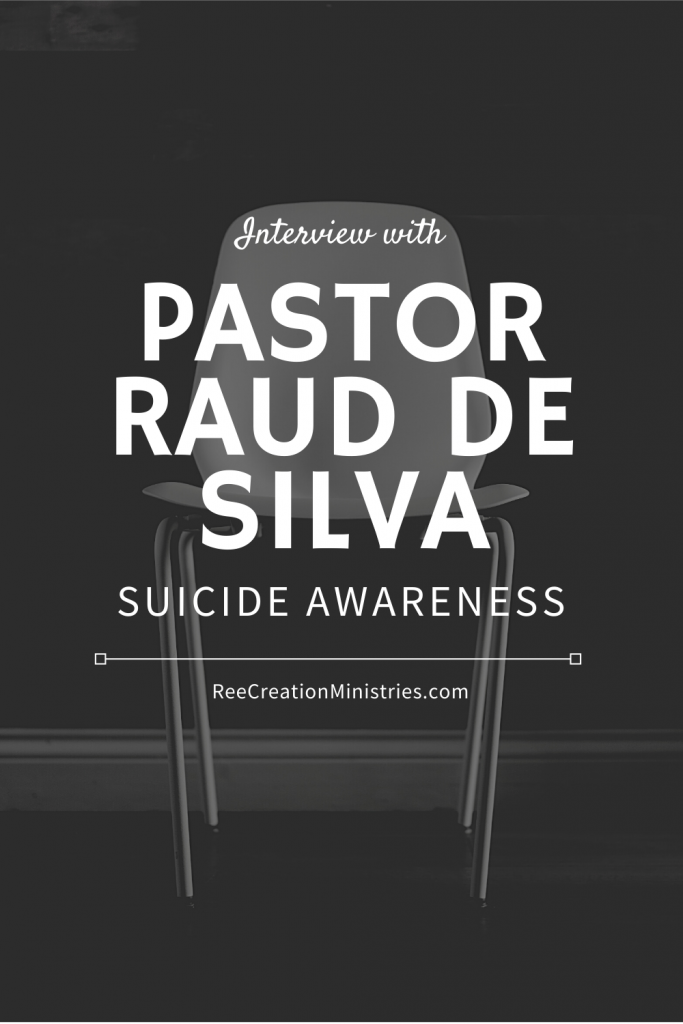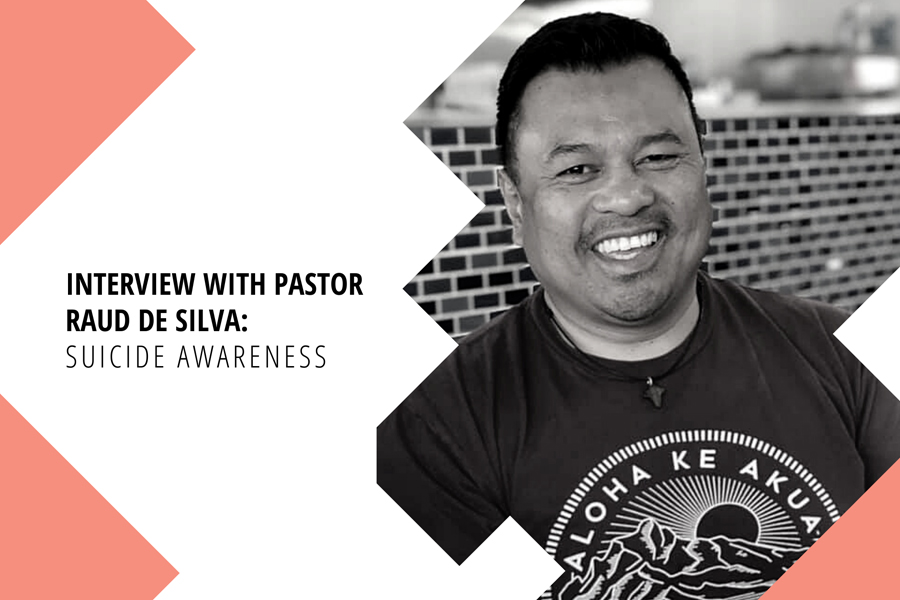National Suicide Prevention Awareness Month
September is also known as National Suicide Prevention Awareness Month. I invited Pastor Raud De Silva for another interview, to talk about suicide and suicide prevention. Pastor Raud is a pastor at Lighbearers Fellowship Church and provides biblical counseling as well as a licensed professional therapist in the Bay area.
I hope through this interview we can provide more insight on the topic of suicide and how we can support those in crisis.
Breaking the Stigma
Reaiah:
From my personal experience many don’t talk much about suicide because of the stigma around it. Why do you think there is such a stigma around suicide or mental illness?
Pastor Raud De Silva:
In general, the negative perceptions associated with having thoughts of suicide or suffering from mental illness hold people back from openly talking about them.
Reaiah:
Why do you think there is such a negative perception around suffering from mental illness? Where do you think the negative perceptions come from?
Pastor Raud De Silva:
Negative perceptions about mental illness can come from multi factors;
- Self – not feeling complete. Comparison with others, feeling less than capable, broken.
- Family – the idea that mental illness reflects on the family, and brings shame.
- Culture – biased and discriminate against those who suffer from the illness.
- Society – not accepting, intolerant, lacks empathy, ignorance about the illness.
- Individuals – not fully understanding the cause / origin of specific mental illness.
- Experience – or perceived functional impairments / limitations brought forth by the illness.
Reaiah:
What are some ways we can help break the stigma? Especially from a Christian perspective. What can the Church do to help break the stigma?
Pastor Raud De Silva:
Leaders and members of Christian church can help in many ways:
- Acknowledge that suicide thoughts and mental illness can happen to anyone. Talk about characters in the Bible that suffered from suicide and mental illness.
- Explain the power of God to heal and carry those who suffer from suicide thoughts and mental illness.
- Use church ministries to provide a safe place where these topics can be discussed for greater understanding, source of support and healing.
- Get and provide training on how to respond to those who suffer from suicide thoughts and mental illness.
- And etc.
Church’s Roles
Reaiah:
In terms of church ministries and training – do you have suggestions of resources or where we can go to get such training? How have you seen churches do this effectively?
Pastor Raud De Silva:
Large churches with big budgets have been able to build department, program and staffing to address, support and counsel those who suffer from mental illness.
There are many christian books written about this topic.
Churches big or small have attempted to address, support and counsel those who suffer from mental illness through individual pastoral counseling, Bible study support groups, workshops and training on identifying, understanding and teaching coping skills.
Churches can help reduce the negative stigma of mental illness through love and sympathy. Love the person, sympathize with the their struggle, offer help and resources.
Churches can help the individual find purpose in life / calling from God despite having to struggle with the illness. They can create an opportunity for the individual to tell his or her story and how God is present in all aspects of their lives. Likewise, churches can talk about those heroes of Christian faith found in the scriptures and how they lived despite having mental illness.
Reaiah:
How can churches improve in this area of ministry?
Pastor Raud De Silva:
What has not worked is:
- Judgmental attitude towards mental illness: statements such as ” caused by sin, punishment from God, doomed for life”
- Not giving opportunity to talk about the mental illness and what life is like for those who suffer from it.
- Focusing on limitations / impairments brought forth by the illness
- Discriminating against those who suffer from it / devaluing the person
- Keeping God and His will / purpose disconnected from the mental illness.
Reaiah:
What has been your experience, either as a pastor or professional therapist, with suicide prevention?
Pastor Raud De Silva:
In my work as a pastor and professional therapist I have seen the effectiveness of listening, talking, providing support, understanding and resource to help those who suffered from suicide thoughts.
Risk and warning signs
Reaiah:
What are some of the things that can put someone at risk of suicide?
Pastor Raud De Silva:
Past, present and future.
- Recurring thoughts of painful past events
- Painful and stressful current events
- Feeling hopeless about the future
These are broad categories, things that put someone at risk of suicide as an individual, case by case. Although it is not always accurate to predict that someone will have suicide thoughts based on a list of things, nevertheless, these things can be useful in assessment, intervention and prevention.
Reaiah:
What are some of the warning signs that someone might be in danger of suicide?
Pastor Raud De Silva:
Warning signs are when the suicide thoughts progress to having intent to do it, having specific plans for how a suicide will be carried through, having the means or access to whatever the person plans to use to carry out suicide.
Long history of suicide thoughts is a warning. A history of suicide attempts is a red light. Having a Family history or knowing someone who committed suicide or had attempted suicide can also be a source of warning.
support in crisis
Reaiah:
How can we support someone in a crisis?
Pastor Raud De Silva:
- As a friend, educate yourself about suicide and mental illness.
- Listen intently to someone dealing with suicide and mental illness.
- Learn to identify warning signs.
- Have in your thoughts, phones or wallets resources you can use to ask for help, intervene and give to someone struggling with suicide thoughts or mental illness.
- Seek help and support from others.
- Debrief with someone you trust after your encounter with anyone that suffered from suicide or mental illness.
Reaiah:
What else would you like us to know about suicide prevention and awareness?
Pastor Raud De Silva:
- [Suicide] can be prevented.
- It requires commitment and patience to help someone struggling with suicide and mental illness.
- It’s okay to accept your limitations and ability to help.
- Be ready and humble yourself to seek help.
- Be cautious about blaming yourself if suicide was not prevented or if the person was not helped the way that you wanted to.
- Debrief with someone so that you can learn from your experience and be willing to help others in the future.

Thank you
I’d like to thank Pastor Raud de Silva for sharing his insight to help bring more suicide prevention awareness. Please pass on this information to others who are struggling or just want to learn more about how to help.
Keep these numbers in your phone or wallet to remember in times of crisis.
Crisis Text Line: Text HOME to 741741
National Suicide Prevention Hotline: 1-800-273-TALK (8255)
Self-Harm Hotline: 1-800-DONT CUT (1-800-366-8288)
Military Helpline: 888-457-4838 or Text MIL1 to 839863
You can watch my previous Interview with Pastor Raud by clicking here. In this interview we discussed the affects of the current pandemic on our mental health, and how we can support those who are struggling.
